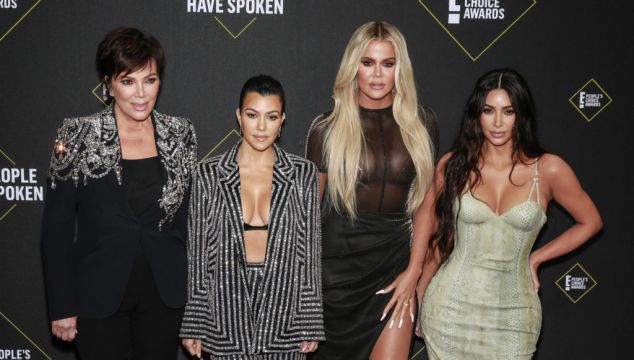The Kardashians and the enduring appeal of reality TV

After a brief hiatus from our screens, the Kardashian-Jenner clan is back with a new TV show.
After 20 seasons of Keeping Up With The Kardashians – a gamechanger in the world of reality TV – the show came to an end in 2021, but they’ve now found a new home on Hulu. Simply called The Kardashians, the series will follow the famous family: Kim, Kourtney and Khloe Kardashian, their half-sisters Kendall and Kylie Jenner, and matriarch Kris Jenner.
It’s already stirred up major buzz, with teaser trailers showing Kourtney’s plans to have a baby with fiancé Travis Barker, and Kim talking about her new relationship with Pete Davidson – as well as plenty of drama, with Kris ending one clip with the ominous words: “Never go against the family.”
The Kardashians first hit our screens back in 2007, and the hype around the new show demonstrates people are still very much interested in watching their every move. But what is it about watching the lives and dramas of ludicrously rich people that is so captivating? And why does reality TV only seem to be climbing in popularity?
It’s a form of escapism
the countdown officially begins now. 🤍 #TheKardashians premieres in 1 month on Hulu, Disney+ internationally and Star+ in Latin America. pic.twitter.com/2WtvpRdrO2
— The Kardashians (@kardashianshulu) March 14, 2022
“People really enjoy the escapism of it,” psychologist and wellbeing consultant Lee Chambers (leechambers.org) says simply – particularly as it’s full of wealth, glitz and glamour. “That kind of lifestyle the Kardashians have is something a lot of people who watch it want, they might potentially aspire to, or be ambitious towards. Through the Kardashians, they can vicariously live that life – and that’s a powerful form of escapism.”
The appetite for these kinds of shows has only grown during the pandemic, when things in real life might have felt particularly tough. “The drama within it, the conflicts and the fallings-out are a great distraction from the things we’re actually struggling with, and the anxieties we have,” says Chambers. “It can almost help us forget, for a little while, that we’ve got stuff going on we don’t want to explore. We can look at those flare-ups and think actually, maybe my little worries are smaller.”
He calls it a “pleasant distraction” from everything that’s going on in the world, particularly as it can feel like we’re constantly bombarded by the “negativity of the news”.
Do we enjoy other people’s dramas?

Reality TV is never short of explosive arguments and dramatic moments – that’s the nature of the genre, and a big reason why we keep going back to it. For Chambers, enjoyment can stem from watching everything unfold, while thinking: “Thankfully, I’m not experiencing this drama.”
He describes a “feeling of relief – at least this drama isn’t happening to me right now, and my family’s not falling apart”.
Within this is an element of schadenfreude – getting pleasure from watching other people’s misfortune, particularly as the subjects, like the Kardashians, tend to be wildly wealthy and privileged. Chambers says: “When we’re watching things happen to other people, quite often we’re like, ‘Whoa, so they’re in this position of privilege, they have access to endless resources, but they still face the same things I feel’. And even better, it’s happening to them, and they’re supposed to have it all.”
We’ve got a relationship with the characters

Even though we know shows like Keeping Up With The Kardashians are highly scripted, they’re different from fictional dramas and we still feel like we’re witnessing real life.
Chambers suggests this sense of realism “amplifies some of the things around parasocial relationships” (one-sided relationships that develop between fans and famous personas). Because the ‘characters’ are real people, “we start to feel like we know them,” explains Chambers. “You’ll speak to a lot of people, and they’ll recognise one of the sisters as someone they could be friends with in real life. There’s probably also a sister they don’t really like, because they don’t recognise themselves in them.”
This makes us feel invested in what happens. “We have that connection to them, and that makes us more compelled to watch it” – particularly if the characters have gone through hardship, and we’re “hoping they will come back to a place of triumph again”, adds Chambers.
This has potentially been amplified over the pandemic too, especially when we weren’t able to be with our actual friends and family. Chambers references the “higher incidence of loneliness and social isolation” since Covid-related restrictions began, causing many of us to find companionship in TV shows.
Forging relationships in the real world is hard work too – so it might be easier to just watch these shows for some people. As Chambers says: “It’s less time-consuming to build those kind of parasocial relationships by watching reality TV, than it is to actually go out and speak to friends in real life.”
It’s easy for your brain

Last but not least, it’s easy comfort for a lot of viewers – and who doesn’t want more of that?
“Like most reality TV, the Kardashians is a very easy watch,” says Chambers. “It doesn’t require a lot of cognitive processing to follow the story.”
It can act like a balm for your brain, particularly when times are stressful. As Chambers observes: “After a long day at work, a long day of parenting, a long day of doing complex tasks, it is nice, simple easy to watch entertainment.”
News
GARDENERS BEWARE: The Hidden Enemies of Your Tomato Plants—and How to Fight Back Fast! /dn
GARDENERS BEWARE: The Hidden Enemies of Your Tomato Plants—and How to Fight Back Fast!Revealed: The Most Common Tomato Ailments and How to Defeat Them Before It’s Too…
Old Doctors: Drink Cumin Water Before Bed to Relieve These 13 Health Issues by Morning! /dn
Unlocking the Ancient Secret: How Cumin Water Can Transform Your Health Overnight For centuries, traditional medicine has revered cumin seeds—known as “jeera” in Hindi—for their potent health…
Goosegrass (Eleusine indica): The Unsung Hero for Kidney Health /dn
Goosegrass (Eleusine indica): The Unsung Hero for Kidney Health Have you ever thought that a common roadside weed could hold the key to better kidney health? Enter Goosegrass (Eleusine…
NO EXERCISE, NO WEIGHT LOSS PILLS – THE 69-YEAR-OLD WOMAN’S SECRET TO LOSS OF 36KG SURPRISES THE WORLD! /dn
NO EXERCISE, NO WEIGHT LOSS PILLS – THE 69-YEAR-OLD WOMAN’S SECRET TO LOSS OF 36KG SURPRISES THE WORLD! In a world where weight loss is often associated…
The Dangerous Allure of Datura – A Beautiful Plant with Hidden Perils /dn
The Dangerous Allure of Datura – A Beautiful Plant with Hidden Perils The plant in question is both captivating and perilous; its beauty masks a dark reality….
Homemade Natural Painkiller: A Simple 3-Ingredient Remedy for Fast Relief /dn
Homemade Natural Painkiller: A Simple 3-Ingredient Remedy for Fast Relief Are you looking for an effective, all-natural way to ease muscle soreness, joint pain, and inflammation? This…
End of content
No more pages to load











